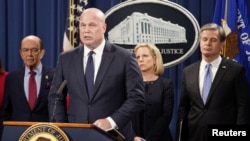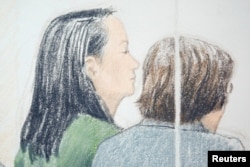Federal prosecutors on Monday announced criminal charges against China's Huawei Technologies, its chief financial officer and several affiliates for alleged financial fraud and theft of U.S. intellectual property.
In a 13-count indictment unsealed in federal court in New York, prosecutors charged the Chinese telecom giant, its top financial officer, Meng Wanzhou , and two affiliates with doing business with Iran in violation of U.S. sanctions.
Huawei said it was “disappointed” to learn of the charges in a statement issued Tuesday. “The Company denies that it or its subsidiary or affiliate have committed any of the asserted violations,” and is not aware of any wrongdoing by Ms. Meng, and believes the U.S. courts will ultimately reach the same conclusion.”
The indictment alleges that Huawei, the world's largest telecommunications company, CFO Meng and other employees engaged in a conspiracy "to deceive numerous global financial institutions and the U.S. government regarding Huawei's business activities in Iran."
As part of the scheme, Huawei operated an Iranian subsidiary, Skycom Tech Co. Ltd., while lying to the U.S. government and financial institutions that Skycom was merely a "business partner," prosecutors said.
Meng, who also is the daughter of Huawei's founder and served on the board of Skycom, was arrested by Canadian authorities at the request of the U.S. government in December. Her arrest further strained U.S.-China relations already roiled by an escalating trade war.
The U.S. has until Wednesday to file a formal request for Meng's extradition. Acting Attorney General Matt Whitaker said the U.S. will move ahead with a formal request.
"As I told Chinese officials in August, China must hold its citizens and Chinese companies accountable for complying with the law," Whitaker said at a press conference in Washington
In a separate, 10-count indictment returned in the western U.S. state of Washington, prosecutors also charged Huawei and its U.S. affiliate, Huawei Device Co. USA, with allegedly stealing trade secrets from U.S. telecom company T-Mobile.
The charges grew out of a lawsuit brought by T-Mobile over a smartphone testing technology dubbed "Tappy."
Huawei claimed the theft was the work of "rogue" employees, but internal emails obtained by the FBI showed that "the conspiracy to steal secrets from T-Mobile was a company-wide effort involving many engineers and employees within the two charged companies."
Company emails also showed that in July 2013, Huawei offered bonuses to employees who stole trade secrets from other companies and provided them to Huawei via an encrypted email address, prosecutors said.
The charges against Huawei were announced by Whitaker, FBI director Christopher Wray, Commerce Secretary Wilbur Ross, Homeland Security Secretary Kirstjen Nielsen, and other top officials.
"These charges lay bare Huawei's alleged blatant disregard for the laws of our country and standard global business practices," Wray said. “Companies like Huawei pose a dual threat to both our economic and national security."
China’s Foreign Ministry issued a statement Tuesday urging Washington to end its "unreasonable" pressure on Huawei and other companies, accusing the United States of using "state power" to hinder legitimate business practices, and demanding the U.S. treat Chinese companies "fairly and justly."
The indictments come as the Trump administration has stepped up enforcement of sweeping economic sanctions on Iran. Ross said the Trump administration has been “tougher” on violators of U.S. exports laws than any past administration.
"For years, Chinese firms have broken our export laws and undermined sanctions, often using U.S. financial systems to facilitate their illegal activities," Ross said. "This will end.
White House spokeswoman Sarah Sanders said the Huawei indictments and the U.S.-China trade dispute are unrelated.
"It's a totally separate process," she said.
The charges against Huawei do not accuse the Chinese government of involvement in the conspiracy. But Democratic Senator Mark Warner, vice chairman of the Senate Intelligence Committee, said no major Chinese company " is independent of the Chinese government and Communist Party."
"It has been clear for some time that Huawei poses a threat to our national security, and I applaud the Trump Administration for taking steps to finally hold the company accountable," Warner said in a statement.
In December, President Donald Trump said he would intervene in the Justice Department’s case against Meng if it helped secure a trade deal with China.
But Whitaker said Meng's extradition will play no role in trade talks between U.S. and Chinese officials that are slated to start in Washington on Wednesday.
"The U.S. Justice Department does its investigations and its charging decisions independent from the White House and we pursue this when the evidence and the facts cause us to seek an indictment from a grand jury," Whitaker said.

